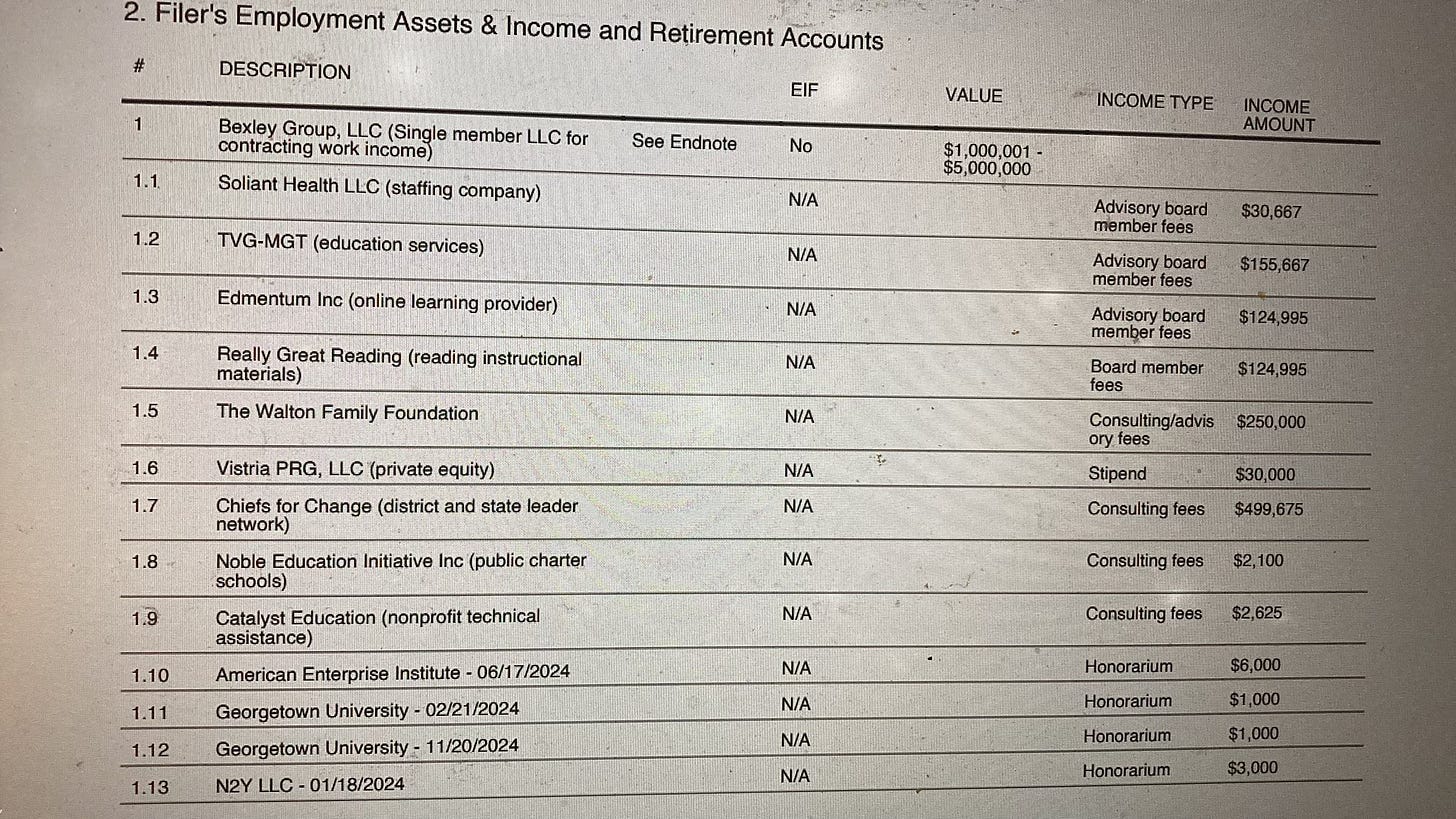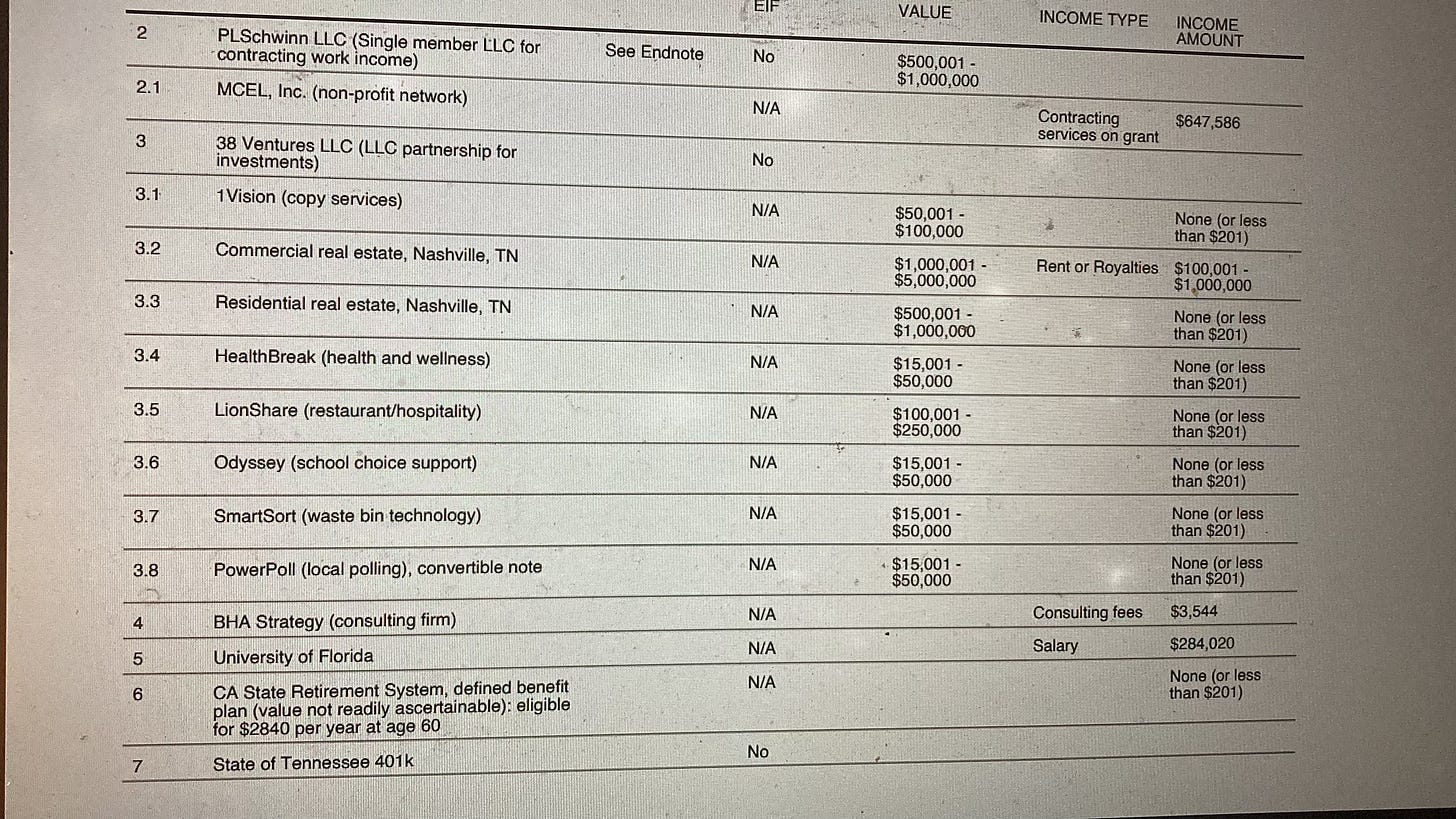Making the Cash Register Ring
Just because so many things are in conflict does not mean that ourselves should be divided.”
― Sophie Scholl
As I settle in to write, I pass by the kids' bedrooms. It's 8:35, and they continue to snooze.
After 9 months of rising at the ungodly hours of 5 and 6 AM, they've earned a brief reprise. Another summer has arrived.
I take a minute to reflect; the eldest just completed her 10th year, while the younger has nine under his belt. Graduation is beginning to appear on the horizon.
This past year was better than some, but not without its tribulations and revealing moments. The hypocrisy of the system is forever bubbling under the surface.
Metro Nashville Public Schools will gladly sell you a t-shirt stating "every child known" and then proceed to ignore those children, both gifted and struggling, whose needs fall outside of the norm.
During Teacher Appreciation Week, educators are showered with gifts and accolades while the rest of the year is spent making them feel underachieving, incompetent, and lazy. All this is done under the guise of doing what's best for kids as if these classroom educators are unaware of the needs of the children they interact with daily.
That hypocrisy was displayed as MNPS schools cut teachers at the end of the year because of budget constraints, even as plans were being made for a weekend principal retreat to Alabama. It appeared lost on all that an entity dependent on local tax dollars was taking those tax dollars and using them to enrich a community in another state.
There are caterers, Uber drivers, restaurants, and hotels in Nashville, or even Tennessee, that would appreciate the support expressed through those tax dollars. Still, MNPS leadership decided that to get the kind of support and learning needed, principals had to go out of state with the city's tax dollars.
I reflect back on the first days of the kids' formal schooling and the promise and joy that came with those days. Fast-forward to today, and somehow, the joy and promise have turned into hope to just be able to grind out the last three years, like the marathon runner entering mile 22 and praying they can find the resolve to get the last two miles.
While the system is infused with failings, it is continually saved by the individual educators. Teachers and principals who constantly serve kids and not the whims of central office bureaucrats fueled by a need to justify their existence continually,
Teachers that break from scripted instruction to address specific questions and needs.
Principals that empower those teachers to dig deep into each child's needs and, through their presence, continually make a school a welcoming and learning space.
It is too easy to get caught up in the failings and shortcomings of a public school system that strives to convert every individual to a data point while forgetting the tireless educators who preserve the human element every day.
I continue to be in awe and inspired by those individuals every day.
Summer is upon us, so get some rest and spend some time reconnecting with your loved ones. Before you know it, you'llbe called upon to work your magic once again.
- - -
At the end of January, former Tennessee Commissioner of Education Penny Schwinn was announced as the nominee for Deputy Secretary of Education for the U.S. Department of Education. A collective groan from the state of Tennessee met the news. We've already watched this trainwreck and had no desire to watch the sequel on the federal level.
Schwinn has yet to be confirmed or even scheduled for a hearing five months later. Last week, rumors began to circulate that the nomination was being pulled. Tennessee's Senator Marsha Blackburn is said to be a strong "no" on Ms. Schwinn.
We all have skeletons in our closets, but if the street talk was to be believed, Ms. Schwinn needed to rent a storage unit to contain hers, and it was busting at the seams. She was also discovering that it was easier to keep those secrets from the local yokels than from the Washington crew.
The Trump administration denied the nomination was in danger and insisted that hearings were just around the corner. Despite my best efforts, I can't confirm a date for the hearing, but what do I know?
At the same time, an interesting document began to circulate: Schwinn's ethics and financial disclosures(Schwinn Financials). This document makes for fascinating reading.
Here in Tennessee, we knew the Commissioner was an earner. I just don't think we realized just how talented she was at bringing home the bacon and frying it in a pan.
Her disclosure sheet shows a financial relationship with at least 25 different organizations and an income totaling more than 1.5 million dollars. That doesn't include income earned from residential real estate held in Sacramento and Orange Beach. The latter has a value attached to it of between 1 and 5 million and brings in an income of between $100K and $1M.
It's not bad for a lifelong public servant.
Some of this income requires minimal work. For example, Schwinn received $155,667 to serve on a TVG-MGT advisory board. Don't confuse an advisory board with a governing body. An advisory board is simply designed to advise; the managing board can heed or dismiss that advice. Typically, an advisory board meets a couple of times a year.
Now, there is an unspoken role that advisory board members are expected to fill. The expectation is that, through their contacts, they will steer business towards the companies that employ them.
It's like being hired as an insurance agent. They expect you to sign up your friends and family, but whether you stay employed or not depends on how much you can expand your sphere of influence.
These other businesses that she lists an affiliation with could count on her being confirmed as Deputy Secretary of Education and the influence that comes with that role. So, while no income is currently listed, the future could be bright.
Schwinn currently earns just shy of $500K from three separate boards. Word from those in the know indicates that she is better at advising than influencing.
In that vein, one company she advises is BHA Strategy. In case you didn't know, that stands for Blake Harris and Associates. That would be former Governor Lee henchman and never-Trumper Blake Harris. You would think this relationship would give cause for pause with the President, but perhaps he's not aware of the depth of the relationship.
According to her filing, the former Commissioner was only paid $3544 for her work, which was enough to qualify her enrollment in a health plan administered by BHA. Hmmm... I'd like to know if all BHA consultants are offered that opportunity.
Let's go a little deeper into the Harris well.
BHA's offices are located at 1230 2nd Ave South, a building owned by 38 Ventures. On her disclosure sheet, Schwinn lists herself as a co-owner of that company. Perhaps the landlord's status qualified her for health benefits.
This filing exposes a plethora of issues. Somewhere, though, the question arises: Is this a Schwinn issue, or perhaps she'sjust a product of the system? It always takes two to tango, and companies like the Walton Group, Chiefs for Change, and Edmentium seem to pop up in these conversations.
It begs the question, who came first, the chicken or the egg?
Is Commissioner Schwinn to be faulted for taking advantage of a system built by people trying to take advantage?
I've long advocated for the Tennessee General Assembly to hold hearings on non-profits' role in setting education policy.
It would be a good place to start.
- - -
A recent federal judge's decision has halted President Trump's proposal to dismantle the U.S. Department of Education (USDOE), bringing some relief to advocates for equal education.
Established in 1979, the USDOE has been vital in ensuring fair access to education and managing federal student aid programs. The debate over dismantling the department raised concerns that local governance could lead to disparities in educational quality, particularly in under-resourced areas.
Many advocates view the USDOE as essential for promoting educational equality, particularly for children in low-income communities and those with special needs who rely on essential programs like Title I and Pell Grants.
Some may criticize federal oversight as bureaucratic overreach. They often overlook the unique challenges faced by marginalized communities that depend on federal support. As education remains a crucial issue, this ruling reinforces that quality education is a public good as opposed to a commercial product.
I remain unconvinced that the USDOE performs an essential task. This ruling also illuminates the difficulty of reducing costs at a federal agency and reiterates that once money is designated, it's nearly impossible to retract.
You can't convince me for a minute that all the people let go were actually performing essential tasks, but here we are.
The Trump administration is appealing the decision through the emergency process, and we can expect another ruling soon.
- - -
Applications continue to flow in for Tennessee's Education Freedom Scholarship program. The TDOE has released data showing that the number of scholarships applied for by families with a qualified income was equal to those for by parents with no economic restrictions.
As of the beginning of this week, the department has received a total of 38,160 applications:
18,852 applications for qualified income scholarships.
19,308 applications for universal scholarships.
Applications have been received from more than 300 zip codes across the state.
An average of 2,935 applications per grade level have been submitted for students entering Kindergarten through 12th grade.
Critics of the program continue to fire away even as applications increase. According to Sam Stockard at the Tennessee Lookout, the program is slated to cost about $400 million next year and escalate to $1.1 billion in five years. Democratic Rep. John Ray Clemmons says, calling Gov. Lee’s program “a scam that will harm students, de-fund public education, and expedite our state’s impending budget crisis.”
Clemmons isn't the only one beating the financial burden drum.
“School vouchers are increasingly eating up state budgets in a way that I don’t think is sustainable long term,” said Whitney Tucker, director of state fiscal policy research at the Center on Budget and Policy Priorities. This think tank advocates for left-leaning tax policies.
A new universal voucher program in Texas is expected to cost $1 billion over its next two-year budget cycle, according to a legislative fiscal note. This figure could balloon to nearly $5 billion by 2030.
Maybe those numbers will bear out, but I'd argue that will matter only to those looking to be king of the silo and looking to say, "Told you so." Legislators better figure it out quickly.
Remember what I wrote earlier? If you giveth, it's nearly impossible to taketh.
Forty thousand voters are not an unsubstantial number, and I doubt concerns over financial instability will outweigh concerns about their children's education.
Another argument frequently advanced is that a larger number of applicants are already enrolled in private schools, the thought being that only wealthy families enroll in private schools. This is not true.
Private schools are filled with families that regularly sacrifice in order to afford a private school education. One mother told me that with some financial help, maybe the family could now actually take a summer vacation. The first in five years.
Furthermore, kids only have 12 years of schooling. Why would you demand that they sacrifice one to satisfy your arbitrary demand?
If I were in charge of a school district, I would probably focus my energies on figuring out why people want out. I would listen to their reasons and figure out how to combat those concerns. What I wouldn't do is dismiss those concerns as simply a by-product of a desire not to have my kids around those kids, insinuating that it's purely a racial issue.
Sometimes, who your kids are around is a legitimate concern. Peer influence significantly impacts children's social and emotional development, shaping their behaviors, values, and self-perception. While peers can be a source of positive influence, like supporting academic goals or developing social skills, they can also exert negative pressure, leading to risky behaviors or bullying.
We live in transformative times, and school districts must adjust or face mounting losses. I can promise that the days of families and students adjusting to schools and the adults who run them are fast fading into the background.
You can wring your hands or get to work, but you can't do both.
- - -
MNPS administrators always like to push a new policy initiative during the last week of school. It's their way of demonstrating that they are still crucial while everyone else is celebrating the end of the year.
This year, the target is substitute teachers.
About four years ago, the districts took a page from my school board platform and created "classroom associates." These are full-time, permanent substitutes assigned to specific schools. They are full-time employees, which makes them eligible for benefits and PD. When a teacher is out, they continue learning that wasn't always possible.
FT substitutes should augment a pool of substitutes, not eclipse them. MNPS doesn't share that view.
Under the new structure, only two groups will be eligible to remain in a limited substitute support role:
Individuals already designated as Substitute Support.
Substitute teachers who worked at least 90 days during the 2024–25 school year. These individuals will receive renewal instructions by Friday, May 23.
Hmmm...last I checked, the substitute shortage still existed. You don't solve scarcity problems by limiting solutions.
In a statement to FOX 17 News, MNPS explained its rationale for the shift:
“MNPS has adopted a classroom associate model that aligns with emerging national best practices for substitute teaching. Classroom associates are full-time employees with benefits, access to professional development opportunities available to other support staff, and a meaningful role in the school community. They are integrated into each school’ssafety plan, participate in safety drills, and build strong connections with students, staff, and the school culture—helping to ensure a more stable and supportive learning environment.
Over the last few years, MNPS has been transitioning to this model as a more effective approach to addressing teacher absences and vacancies. One of our top priorities is ensuring that students are well-supported during times when their regular teacher is unavailable.
In the 2023–24 budget, Mayor Cooper allocated $10.8 million to fund several hundred classroom associate positions. This investment has helped schools maintain consistency and quality in student experiences despite staffing challenges.
While MNPS will continue to utilize the traditional substitute model—where substitutes can accept daily assignments based on school needs—we will continue prioritizing the classroom associate model for the 2025–26 school year. This approach allows schools to better plan for continuity in instruction and support, ensuring that student needs are met every day.”
You know you are in trouble when they evoke the "National best practice" defense. In this case, they acknowledge that it'san emerging model, not an established one. Words matter.
In the words of the Professional Educators of Tennessee head honcho, the district should be careful not to eliminate day-to-day substitutes.
“Teachers depend on certain substitute teachers when they're going to be absent,” Bowman said. “This is going to, in my opinion, hurt schools.”
Acknowledging that classroom associates are not the only substitutes who play a meaningful role in the school community would be helpful.
Classroom associates are an excellent plan; you just better hope you don't have more teachers out than classroom associates.
Also, it wouldn't hurt MNPS director Dr. Adrienne Battle and her team to remember that how you communicate is every bit as important as what you communicate.
- - -
If you want me to highlight and share something, send it to Norinrad10@yahoo.com. Wisdom or criticism is always welcome.
As you may suspect, keeping this blog going comes at a cost. In that light, I’ve set up several ways for you to show your financial support.
I invite you to subscribe to Substack. The rates are reasonable if you become a paid subscriber, and a free option remains. The only difference is that one allows me to eat better, but I appreciate you signing up for either.
You can also donate through my Venmo (Thomas-Weber-10) or Cash App ($PeterAveryWeber)
A massive shout-out to all of you who’ve already lent your financial support. I am eternally grateful for your generosity. It allows me to keep doing what I do, and without you, I would have been forced to quit long ago. It is truly appreciated and keeps the bill collectors happy. Now more than ever, your continued support is vital.
If you wish to join the ranks of donors but are not interested in Substack, you can still go to Patreon and help a brother out.






